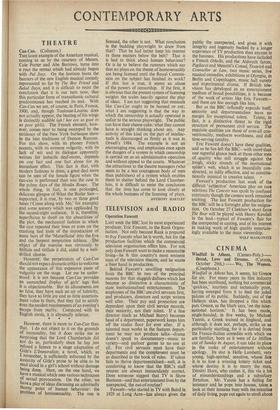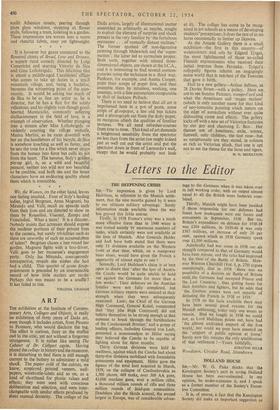CINEMA
Windfall in Athens. (Cameo-Poly.)--- Bread, Love and Dreams. (Curzon, October 29th.) — We, The Women. (Cinephone.)
Windfall in Athens has, it seems, hit Greece for six. For many years its film industry has been moribund, nothing but commercial 'quickies,' inartistic and technically poor, having emerged from it to feed the jaded palates of its public. Suddenly, out of the Hellenic skies, has dropped a film which puts Greece, as the blurb says, 'on the inter- national horizon.' It has been made, single-handed, in five weeks, by Michael Yannis, a Greek trained in England, and although it does not, perhaps, strike us as particularly startling, for it is derived from the Franco-Italian comedies with which we are familiar, born as it were of Le Million out of Sunday in August, it can take its place in the ranks of entertainment without apology. Its star is Helle Lambetti, very young, high-spirited, sensitive, whose fate it is to lose a winning lottery ticket and whose destiny it is to marry the man, Dimitri Horn, who cashes it, this via a lot of misunderstandings and a subsidiary flirtation. Mr. Yannis has a feeling for intimacy and he pops into houses, takes a look at their inmates busy with the minutiae of daily living, pops out again to stroll about sunlit Athenian streets, peering through plate glass windows, stopping at flower stalls, following a tram, loitering in a garden. These impressions are woven into a warm and cheerful fabric, cosy yet lightweight.
* * * • It is however but gauze compared to the flowered chintz of Bread, Love and Dreams, a superb rural comedy directed by Luigi Comericini and starring Vittorio de Sica and Gina Lollobrigida. This felicitous film is about a middle-aged Carabinierf officer who comes to take up duties in a small mountain village, and, being a bachelor, becomes the whispering point of the com- munity. It would be asking tao much of de Sica to be as fine an actor as he is director, but he has a flair for the subtly ridiculous, and his slightly vain though good- hearted Maresciallo, constantly suffering disillusionment in the field of love, is a -triumph of observation. Whether plunging into a stream after Miss Lollobrigida or violently courting the village midwife, Marisa Merlini, as he races downhill with her on the handlebars of his bicycle, de Sica is somehow touching as well as funny, and he sets the tone for a film which never strays from the human into farce but culls its wit from the heart. The heroine, Italy's golden pin-up girl, is, as a wild and beautiful peasant, neither too wild nor too beautiful to be credible, and both she and the lesser characters have an endearing quality about them which is irresistible.
* * We, the Women, on the other hand, leaves one feeling insulted. Four of Italy's leading ladies, Ingrid Bergman, Anna Magnani, Isa Miranda and Valli, recall an episode each from their lives and are directed to show us them by Rossellini, Visconti, Zampa and Franciolini. What a team! It is a disaster. Nobody insists that actresses should expose the tenderer portions of their private lives to the camera, but surely trivialities such as these are unworthy of such an accumulation of talent? Bergman chases a hen round her garden, Magnani fights with a taxi-driver, Valli goes to her masseuse's engagement party. Only Isa Miranda, courageously introspective, reveals she wishes she had had a child. This quartet of acute disap- pointments is preceded by an interminable record of how little starlets are made. Perhaps this was meant to be a soufflé ? It has failed to rise.
VIRGINIA GRAHAM



































 Previous page
Previous page